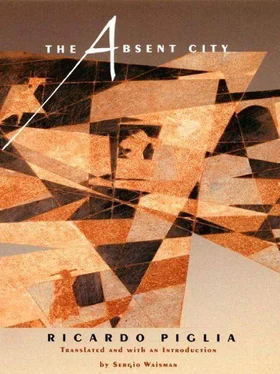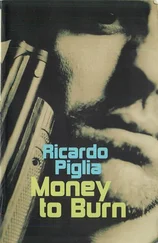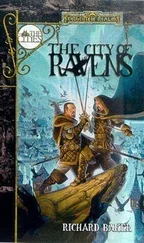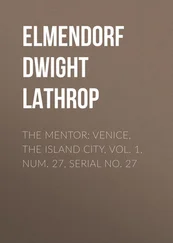The story exhibited Stevensen’s marks. Junior found the black coat with the leather elbow patches hanging in a closet out in the country. He found a magnifying glass, a train schedule, a monogrammed ring and a bar of sealing wax. On the desk was the draft of the second page of a letter by Stevensen, written in blue ink on a piece of notebook paper: “I like this place, because it has managed to stay just as it was at the precise moment in which it was rebuilt. I feel as if I were living in another time, as if it were the landscape of childhood, but also the abstract and anonymous landscape that old people see in their dreams. The town was completely destroyed in the war.” Impressions formed a part of the building of history. It was not possible to adjust to a set time, space was at once uncertain and detailed with minute precision. There was a map of the countryside and a photograph of the station in Necochea. The town was near Quequén, the borders of the large cattle ranch stretched out as far as the sea. On the back wall he saw the photograph of the building, with the covered porch and the water tank. On a counter covered with sand was a replica of the establishment built to scale, with the wire fences and the front gate, the long house, the quarters for the workers, the corrals facing the railroad tracks. If he lifted the wooden roof he could see the layout of the rooms inside the house. A corridor, the adjoining rooms that faced the patio, the kitchen, the long foldout table. On the other wall there was a map of the town, with numbered streets that ended at the port. To the left he saw the dock and the lighthouse, and to the right the wooded road that led to the Hotel Colón. To a side were Stevensen’s record player, along with a tape recorder and a radio.
Junior thought about his father, another Englishman lost in the Pampas who collected radio devices and built high-power receivers so he could follow the broadcasts of the BBC. English inventors, railroad engineers, European scientists exiled after the war. Junior went back to the story about Richter, the German physicist who had been invited to come to Argentina by Perón. He was not the only one to whom the story might refer. Many scientists had been working in Argentina since the turn of the century. In the third volume of the Dictionary of Scientific Biographies he found the German track he was looking for: “The National University of La Plata, sixty kilometers south of Buenos Aires, has received a large number of European researchers of the highest level since the first decades of the century. Among them, Emil Bosse, the old editor in chief of the journal Physikalische Zeitschrift; Bosse’s wife, Margrete Heiberg, who undertook her graduate studies at Gotinga; Konrad Simons, a physicist who worked with Planck and Richard Gans, at that time an authority in the field of terrestrial magnetism.” He was sure one of them had been Stevensen, he was sure that was the secret name of the Engineer who had worked with Macedonio in the programming of the machine. Junior walked to the window and opened the blinds. Outside, the city. The empty streets, the lights, the subway entrance across the way. He could talk to Hannah. She would help him. When her father had died she had decided to leave behind the academic world — she had once taught philosophy — and transform the bookstore that her grandfather had founded in 1940 into the main center of documentation and reproductions of the Museum of the Novel in Buenos Aires. She had all the series, all the variations, the different editions, and she sold tapes and original stories.
A few suspected that Hannah herself had secret connections with the machine. That she distributed apocryphal stories and false versions, that she was part of the counterinformation groups who sold replicas, copies made in labs mounted in clandestine suburban garages. They had never been able to pin anything on her, but they kept a watch over her and occasionally closed down her business. They wanted to intimidate her, but she continued to fight, because she was proud and rebellious, a queen in the secret court of the city. Junior knew her from before. She was the kind of woman he had always liked, incredibly intelligent and up-front. To see her meant that they would open a file on you, but they already had a file on Junior, and he could not count on receiving legal protection from the newspaper anyway. Better not to let them know he was going to see her, he preferred to move freely as long as he could.
He got out at the Nueve de Julio exit. The corridors were filled with stands and kiosks that sold miniatures and war magazines. Young draftees stopped at the porno shops and the micromovies, the shooting galleries, the cheap bars with pictures of half-naked blondes, the lottery booths. Toward the back there were rickety sheds and locales bunched up along the corridors that took advantage of the continuous traffic of the many people who traveled by subway. With their spiked hair and their torn Levi’s, their knives sheathed inside their boots, the youth had invaded the bars. Dressed in tight black city jackets, they made them play heavy metal over the loudspeakers. One of the lateral passages led to a hall that connected directly to an exit. It was like a cone of silence, with a cloudy glare coming down from the street. To one side there was a watchmaker’s shop and, across from it, Hannah Lidia’s shop. He knocked on the glass door and shortly afterward a light came on inside, in the back. She opened the door in her usual state of relaxed fatalism. She was wearing velvet pants, a man’s vest, anticancer bracelets. This time she had her hair up like Prince Valiant, everything was very New Age, total snob mask. She cultivated a slightly psychotic look and was never surprised to see him, even if he had not come by in months. The place had a very tall ceiling and was connected to the subway. It was cold inside. The books were piled up in no particular order whatsoever, and the place gave him an instantaneous feeling of well being. A large photograph of Macedonio Fernández covered the back wall. The room was on the other side of a beaded curtain. A TV on the night table, piles of dirty dishes in a circle around the bed. Two bottles of Black & White on a footstool. She sat on the floor and kept watching TV. She never seemed to grow older. She wore blue contact lenses and had a Museum tattoo on her arm. Junior was glad that she went on living her life without pretending to be interested in him. That she did not ask him what he had been doing, nor how he was, nor where he had been. The last time they saw each other they had kissed next to the stairs, but Hannah had suddenly told him to let go. You’re sinking, Junior, she had said to him. He worked at the newspaper, he wrote trash, he was getting cynical. She had not wanted to see him anymore. He had laughed. Who do you think I am? The Titanic? he had answered. We’re all sinking, kid. He remembered the woman in the Majestic. It was the same thing. Hannah never left her haunt, either. She went on eating from her plate of ravioli and watching the Mexican channel on TV.
“I read your reports,” she said to him. “You’re blind.”
“Why? It’s bait,” Junior said. “I print everything. They want to make a little bit of noise at the paper to see if they react.”
“They won’t react,” she said. “They want to take her out of circulation. They are going to close down the Museum.” She raised her face from the plate and looked at him with her blue eyes. “Do you know what they are about to do?”
Junior slid his finger across his throat.
“Zip,” she said. “They want to stow her away, send her to the museum in Luján. Anything, to get people to forget.”
“And they will forget.”
“Don’t believe it. I’ve seen several xeroxes of stories from the fifties, versions from the war, science fiction stories. Pure realism.”
Читать дальше












